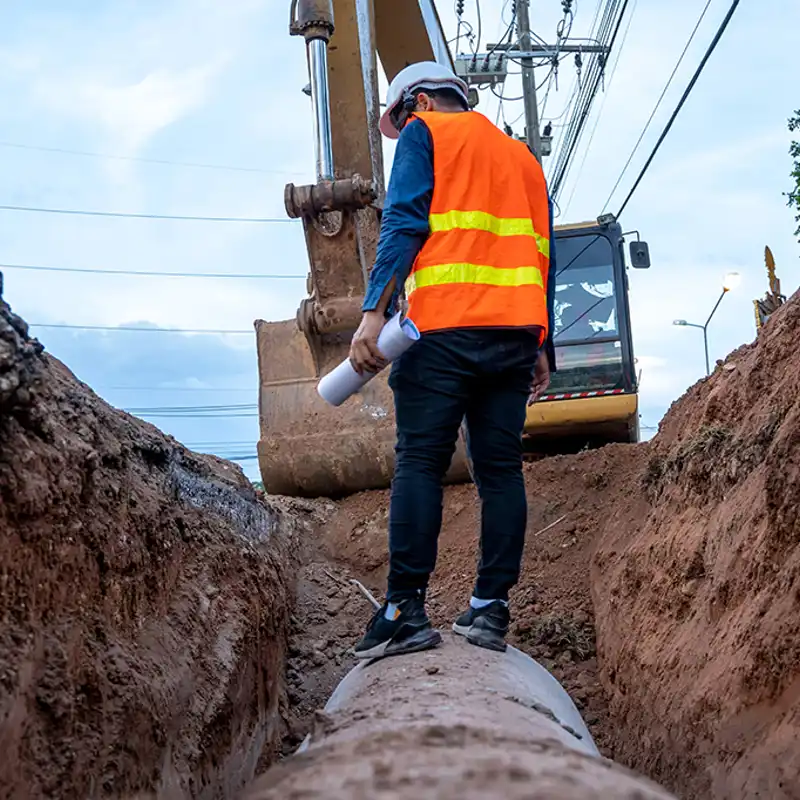Bonds. Surety Bonds.
All types. All states. The very best solutions for your surety bond needs.Find the Surety Bond You Need
Bonds by Type
Bonds by State
Why Get Bonded Through NFP?
Fast and Easy
Our online application makes it easy. Leave the complexity to us with our in-house authority and decision-making.
All Types. All States.
No matter what project you're working on or what state you're in, we can help you find the surety bond you need.
Experienced and Expert Team
Our surety experts have the tools and talent to position you to qualify for the capacity needed for your project.
Strong Relationships
We work with key decision-makers at the top sureties, both regionally and nationally.
Pricing Flexibility
Great credit to distressed credit, we have all types of solutions.
Types of Surety Bonds
Get started by determining the type of bond you need. Not sure? Look at the common types below or connect with the expertise and guidance of one of our surety bond specialists. Keep it simple and leave the complexity to us.
Featured Bonds
Additional Commercial Surety Bonds
Featured Bonds
Additional Construction Surety Bonds
Featured Bonds
Additional License and Permit Surety Bonds
Surety Bonds Explained
A surety bond is a legally binding contractual agreement between three parties, all of whom are involved in a work task or project.

Typically a professional contractor offering services to the public for which he has been trained and has provided for some time.

Hires the contractor with the understanding that certain terms specified in the surety will be lived up to, such as:
Quality of workmanship
Completion of specified work
Time constraints

Acts as a kind of insurance company that sells the surety to a principal. The surety must pay out an amount of money to the obligee when any claims are made against the bond.
Surety Bond FAQs
A surety bond is a type of contract that involves three parties: the principal, the obligee, and the surety. It is essentially a guarantee that the principal (the person or business purchasing the bond) will fulfill their obligations to the obligee (the entity requiring the bond, often a government or regulatory body). If the principal fails to meet their obligations, the surety (typically an insurance company or a bonding company) agrees to compensate the obligee for any financial losses, up to the bond's limit.
Surety bonds are commonly used in industries like construction, finance, and real estate. For example, contractors may need a surety bond to ensure they complete a project as per the contract terms. If they default, the bond covers the cost of completing the work. The principal must repay the surety for any claims made against the bond, meaning the bond is not insurance for the principal but rather a promise to fulfill a financial responsibility.
There are several types of surety bonds, including performance bonds, payment bonds, and license and permit bonds. Each type serves a different purpose but ultimately protects the obligee from the principal's failure to meet contractual or legal obligations.
Overall, surety bonds help foster trust and accountability, providing a financial safety net for parties involved in various agreements and ensuring that obligations are met as agreed.
Surety bonds work as a financial guarantee that ensures a principal (the person or business required to have the bond) will fulfill their obligations to a third party, known as the obligee. The process involves three parties: the principal, the obligee, and the surety.
- Principal: This is the party that purchases the bond and promises to fulfill the obligations as specified by the obligee (such as completing a contract, paying debts, or adhering to regulations).
- Obligee: This is the party that requires the bond, usually a government agency or a business, to protect against the principal’s failure to perform as expected.
- Surety: A surety, typically an insurance or bonding company, guarantees that the principal will meet their obligations. If the principal defaults, the surety steps in and compensates the obligee for losses, up to the bond’s value.
When a claim is made due to the principal's failure to fulfill their obligations, the surety compensates the obligee for damages or financial loss. However, the principal is still responsible for repaying the surety for the amount paid out. This repayment obligation ensures the principal has a financial incentive to avoid defaulting on their responsibilities.
The cost of a surety bond, also known as the premium, generally ranges from 1% to 15% of the total bond amount. This percentage depends on several factors, including the type of bond, the principal’s credit history, the bond amount, and the risk associated with the specific obligation.
For example, if you require a $100,000 surety bond and your premium rate is 3%, the bond will cost you $3,000. However, the rate can vary significantly. If you have excellent credit, you may qualify for a lower rate, often around 1% to 3%. On the other hand, if you have poor credit or the bond involves a higher level of risk (a high-value project or complex contract), the premium could be as high as 10% to 15% of the bond amount.
Some types of surety bonds, like license and permit bonds, may have a lower premium cost, often around $50 to $500 for smaller bonds. Contract bonds, such as performance or payment bonds for contractors, tend to be more expensive because they cover larger risks.
The cost of a surety bond may also be influenced by the principal's financial stability, business history, and the nature of the project. Bond providers typically assess the risk involved before determining the premium rate.
Yes, surety bonds can expire, but the length of time before expiration depends on the specific terms of the bond and the obligations it covers. Most surety bonds are issued with a set term, which typically ranges from one year to the duration of a specific project or contract. After the term ends, the bond may need to be renewed or replaced to remain valid.
For example, many business-related surety bonds, such as license and permit bonds or contract bonds, are issued for one year. After that period, the principal (the party purchasing the bond) must renew the bond by paying another premium. If the bond is not renewed, the bond becomes inactive, leaving the principal without protection and potentially putting the obligee (the entity requiring the bond) at risk.
Continuous bonds are also common, particularly for long-term obligations. These bonds may not have a fixed expiration date but are automatically renewed each year unless one of the parties decides to terminate the agreement. The principal is typically required to pay the renewal premium annually.
In certain cases, like with construction bonds for a specific project, the bond may expire once the project is completed and all obligations are fulfilled. However, some bonds remain in effect for a specified period after the project's completion to cover any potential issues or claims that arise.
Ultimately, whether a surety bond expires depends on the terms outlined in the bond agreement, and it's important for the principal to stay aware of renewal requirements to maintain compliance and protection.
Whether or not you need to get a surety bond depends on the type of business you have, the industry you're in, and the specific regulations or contracts you're dealing with. Here are a few situations where you might be required to obtain a surety bond:
- Legal or Regulatory Requirements: Many industries, especially those involving licensing or permitting (such as contractors, real estate agents, or auto dealerships), require surety bonds by law. A license and permit bond ensures that you will comply with local, state, or federal regulations. Without this bond, you may not be allowed to operate legally in certain fields.
- Contractual Obligations: If you're involved in large projects, especially in construction or service contracts, the project owner may require you to have a performance bond or payment bond. These bonds guarantee that you will complete the project according to the terms and pay your subcontractors or suppliers. Failing to secure these bonds may prevent you from winning contracts.
- Protecting Clients or Customers: Even if a bond isn’t required by law, some businesses purchase bonds to reassure clients that they will meet their obligations. For example, a contractor might get a bond to show they will complete a job as promised.
- Building Trust: Surety bonds can help build credibility and trust with clients, government agencies, and partners. It shows you’re financially responsible and have a backup if things don’t go as planned.
If you're unsure whether you need a surety bond, check with local regulatory authorities, review contract terms, or contact us so we can guide you based on your situation.
Getting a surety bond involves a few straightforward steps. Here's a breakdown of the process:
- Determine the Type of Bond You Need: First, identify which type of surety bond is required for your specific situation. Common types include license and permit bonds, performance bonds, and payment bonds. The requirements will depend on your industry, the project you're working on, or local regulations.
- Submit an Application: Our short online application makes it easy.
- Underwriting Process: The surety company will review your application through an underwriting process. This involves evaluating your credit history, financials, and any other relevant factors to assess the level of risk. For businesses with strong financial histories, bonds might be approved quickly, while others may face higher premiums or require additional documentation.
- Pay the Premium: After approval, you’ll be given a premium quote. This is usually a percentage of the bond amount. Once you pay the premium, the bond will be issued.
- Maintain the Bond: Depending on the bond type, you may need to renew it annually or for the duration of the project.
If you’re unsure about the process, connect with the expertise and guidance of one of our surety bond specialists. Keep it simple and leave the complexity to us.
Types of Surety Bonds
Get started by determining the type of bond you need. Not sure? Look at the common types below or connect with the expertise and guidance of one of our surety bond specialists. Keep it simple and leave the complexity to us.
Commerical Surety Bonds
Construction Surety Bonds
License and Permit Surety Bonds
Surety Bonds Explained
A surety bond is a legally binding contractual agreement between three parties, all of whom are involved in a work task or project.
1. Principal
Typically a professional contractor offering services to the public for which he has been trained and has provided for some time.
2. Obligee
Hires the contractor with the understanding that certain terms specified in the surety will be lived up to, such as:
- Quality of workmanship
- Completion of specified work
- Time constraints
3. Surety Company
Acts as a kind of insurance company that sells the surety to a principal. The surety must pay out an amount of money to the obligee when any claims are made against the bond.
Surety Bond FAQs
A surety bond is a type of contract that involves three parties: the principal, the obligee, and the surety. It is essentially a guarantee that the principal (the person or business purchasing the bond) will fulfill their obligations to the obligee (the entity requiring the bond, often a government or regulatory body). If the principal fails to meet their obligations, the surety (typically an insurance company or a bonding company) agrees to compensate the obligee for any financial losses, up to the bond's limit.
Surety bonds are commonly used in industries like construction, finance, and real estate. For example, contractors may need a surety bond to ensure they complete a project as per the contract terms. If they default, the bond covers the cost of completing the work. The principal must repay the surety for any claims made against the bond, meaning the bond is not insurance for the principal but rather a promise to fulfill a financial responsibility.
There are several types of surety bonds, including performance bonds, payment bonds, and license and permit bonds. Each type serves a different purpose but ultimately protects the obligee from the principal's failure to meet contractual or legal obligations.
Overall, surety bonds help foster trust and accountability, providing a financial safety net for parties involved in various agreements and ensuring that obligations are met as agreed.
Surety bonds work as a financial guarantee that ensures a principal (the person or business required to have the bond) will fulfill their obligations to a third party, known as the obligee. The process involves three parties: the principal, the obligee, and the surety.
- Principal: This is the party that purchases the bond and promises to fulfill the obligations as specified by the obligee (such as completing a contract, paying debts, or adhering to regulations).
- Obligee: This is the party that requires the bond, usually a government agency or a business, to protect against the principal’s failure to perform as expected.
- Surety: A surety, typically an insurance or bonding company, guarantees that the principal will meet their obligations. If the principal defaults, the surety steps in and compensates the obligee for losses, up to the bond’s value.
When a claim is made due to the principal's failure to fulfill their obligations, the surety compensates the obligee for damages or financial loss. However, the principal is still responsible for repaying the surety for the amount paid out. This repayment obligation ensures the principal has a financial incentive to avoid defaulting on their responsibilities.
The cost of a surety bond, also known as the premium, generally ranges from 1% to 15% of the total bond amount. This percentage depends on several factors, including the type of bond, the principal’s credit history, the bond amount, and the risk associated with the specific obligation.
For example, if you require a $100,000 surety bond and your premium rate is 3%, the bond will cost you $3,000. However, the rate can vary significantly. If you have excellent credit, you may qualify for a lower rate, often around 1% to 3%. On the other hand, if you have poor credit or the bond involves a higher level of risk (a high-value project or complex contract), the premium could be as high as 10% to 15% of the bond amount.
Some types of surety bonds, like license and permit bonds, may have a lower premium cost, often around $50 to $500 for smaller bonds. Contract bonds, such as performance or payment bonds for contractors, tend to be more expensive because they cover larger risks.
The cost of a surety bond may also be influenced by the principal's financial stability, business history, and the nature of the project. Bond providers typically assess the risk involved before determining the premium rate.
Yes, surety bonds can expire, but the length of time before expiration depends on the specific terms of the bond and the obligations it covers. Most surety bonds are issued with a set term, which typically ranges from one year to the duration of a specific project or contract. After the term ends, the bond may need to be renewed or replaced to remain valid.
For example, many business-related surety bonds, such as license and permit bonds or contract bonds, are issued for one year. After that period, the principal (the party purchasing the bond) must renew the bond by paying another premium. If the bond is not renewed, the bond becomes inactive, leaving the principal without protection and potentially putting the obligee (the entity requiring the bond) at risk.
Continuous bonds are also common, particularly for long-term obligations. These bonds may not have a fixed expiration date but are automatically renewed each year unless one of the parties decides to terminate the agreement. The principal is typically required to pay the renewal premium annually.
In certain cases, like with construction bonds for a specific project, the bond may expire once the project is completed and all obligations are fulfilled. However, some bonds remain in effect for a specified period after the project's completion to cover any potential issues or claims that arise.
Ultimately, whether a surety bond expires depends on the terms outlined in the bond agreement, and it's important for the principal to stay aware of renewal requirements to maintain compliance and protection.
Whether or not you need to get a surety bond depends on the type of business you have, the industry you're in, and the specific regulations or contracts you're dealing with. Here are a few situations where you might be required to obtain a surety bond:
- Legal or Regulatory Requirements: Many industries, especially those involving licensing or permitting (such as contractors, real estate agents, or auto dealerships), require surety bonds by law. A license and permit bond ensures that you will comply with local, state, or federal regulations. Without this bond, you may not be allowed to operate legally in certain fields.
- Contractual Obligations: If you're involved in large projects, especially in construction or service contracts, the project owner may require you to have a performance bond or payment bond. These bonds guarantee that you will complete the project according to the terms and pay your subcontractors or suppliers. Failing to secure these bonds may prevent you from winning contracts.
- Protecting Clients or Customers: Even if a bond isn’t required by law, some businesses purchase bonds to reassure clients that they will meet their obligations. For example, a contractor might get a bond to show they will complete a job as promised.
- Building Trust: Surety bonds can help build credibility and trust with clients, government agencies, and partners. It shows you’re financially responsible and have a backup if things don’t go as planned.
If you're unsure whether you need a surety bond, check with local regulatory authorities, review contract terms, or contact us so we can guide you based on your situation.
Getting a surety bond involves a few straightforward steps. Here's a breakdown of the process:
- Determine the Type of Bond You Need: First, identify which type of surety bond is required for your specific situation. Common types include license and permit bonds, performance bonds, and payment bonds. The requirements will depend on your industry, the project you're working on, or local regulations.
- Submit an Application: Our short online application makes it easy.
- Underwriting Process: The surety company will review your application through an underwriting process. This involves evaluating your credit history, financials, and any other relevant factors to assess the level of risk. For businesses with strong financial histories, bonds might be approved quickly, while others may face higher premiums or require additional documentation.
- Pay the Premium: After approval, you’ll be given a premium quote. This is usually a percentage of the bond amount. Once you pay the premium, the bond will be issued.
- Maintain the Bond: Depending on the bond type, you may need to renew it annually or for the duration of the project.
If you’re unsure about the process, connect with the expertise and guidance of one of our surety bond specialists. Keep it simple and leave the complexity to us.
Let NFP Help You Get Bonded Today
NFP’s Surety team brings together nationally recognized, senior surety experts focused on positioning your organization to capitalize on opportunities across industries.

We maintain strong, long-term relationships with key decision-makers at the top sureties, both regionally and nationally. Those relationships allow us to understand and react quickly to shifts within the surety marketplace that may impact our clients. Our local and national involvement in trade organizations keeps us aware of the challenges facing our clients in the construction industry today.
Our surety specialists have the expertise to push you forward. From supporting production companies securing completion bonds to billion-dollar co-surety programs for domestic and international contractors, we’ve got the tools and talent to position you to qualify for the capacity they need.
Questions? Reach out to our Surety practice leader today:





